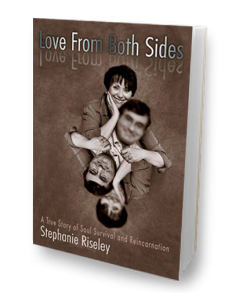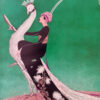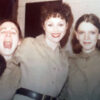If you haven’t read my last blog about the “Jewish Nazi,” please take a moment and skim it now, okay?
I saw Christina, the beautiful 38 year-old single working mother, again last Saturday. She told me how much the work helped make sense of the extreme abuse she’d endured as a child, and why she’d chosen such a challenging incarnation in this lifetime. She said that her depression had lifted, but she said that she still felt “blocked,” and wanted to discover why she continued to sabotage herself in almost every area of her life.
We all have so many lifetimes to choose from, and knowing what question to ask to get a specific result is what I have to figure out. The question that opened up Christina’s former Jewish Nazi life for her was, “Why are you afraid of your power?” And because I asked that question, she saw a life where she had abused power and died deeply ashamed of what she’d done. Uncovering a traumatic past life like that is precisely why I won’t do “hit and run” regressions. Because if she’d walked into my office, seen that past life, and then walked out without seeing any other lifetime, or knowing how to process what she’d just experienced, it wouldn’t have been good. She wouldn’t have benefited from the experience at all. It might have actually been quite damaging. That’s why I insist on doing at least five sessions.
From Christina’s point of view, her mother had always resented her. On a logical level, her father had deserted the family just after Christina’s birth, leaving a flipped out woman with two small children to support in a war-torn South American city. I doubt that her mother was in a good mood. So I began the regression by asking, “Why did you choose your mother?” And Christina saw a past life where she was a wife and her own mother was her mother-in-law in that past lifetime. In that lifetime the two women were bitter rivals for the love of one man, and from Christina’s perspective, she choose her mother in this lifetime to “turn her around.” And Christina said that in point of fact, she had made her mother respect her and that now she and her mother are good friends. That lifetime falls into the “bread and butter” category of lives. You get born, get married, have kids and die.
Her self-sabotaging might be coming from “faulty assumptions” in this lifetime, because of abuse she received. She might have made the faulty assumption that she’s worth fighting for, so I wanted to show her a life where she died proud of what she had accomplished. After she died in that past lifetime, I took her to the “In Between” and I asked her guide to show her a life where she used her power for good.
“Look at your feet,” I said.
“I have brown boots on, and a long brown dress with a white apron.” She was quiet as she took in the whole scene. “I’m helping runaway slaves escape. I’m part of the under-ground railroad. I’m in Pennsylvania. I’m so feisty!” She smiled broadly – she loved this woman!
“Let’s go find your parents in that lifetime,” I said.
“Sara’s my mother again!” (Sara’s a friend and was her mother in her Nazi life, too.) “Oh, and Sara’s husband is my father in that lifetime. I want to go college, but no college will let me in, but I’m determined. My father encourages me, so I go to a college and just try to get in. But they refuse to let me in because I’m a girl. I’m totally dejected and I go outside and sit by a tree and cry. This wonderful boy comes up and sits next to me. I tell him why I’m so angry and he tells me not to worry. He’ll share his college with me. We’ll study the same books and we’ll get education. I love this man so much, because that’s exactly what happened.”
Christina stopped speaking. I couldn’t see what she was seeing, and she wasn’t saying anything. She was just taking in the love and looking at the life they created. They couldn’t have children, but it didn’t matter to her, because she had other things to do. I think he was a carpenter, and they had a farm and they were surrounded by lots of wonderful people. I think they were fierce Abolitionists, so that when the Civil War began, they were activists.
“We have an amazing garden. And we can things… we put things in glass jars and we sell them!”
I asked if she could see the label. And she said, “Yes. It’s brown, and it says Country Grown.” She went on to describe how she was surrounded by young black children and how she taught them to read. She thought she had an orphanage. Then she was very old, and her husband was in a wheel chair. They were still so much in love. They simply adored one another. And then she gasped. “Oh, no!” she cried. “I died! A heart attack!”
“Float above,” I said, but she wouldn’t. She was so concerned about her husband who simply was beside himself with grief.
“He’s going to kill himself,” she said. “There’s so much blood. He shot himself in the head. He’s going to go somewhere dark! He’s so afraid.”
“He’s going to be fine.” I said, “He’s just meeting his own expectations. But soon he’ll be up in the cluster. Don’t worry. There’s no penalty for suicide. There is no purgatory.”
Then she went to the In Between, where she was welcomed by her soul group, the cluster, with big cheers. Always good. And then she saw her husband – he was there to greet her too. I asked the guide if she was going to meet him again, or if she already had.
She knew that she’d already met him. She went out on date with him three years ago, and even though she’d had an amazing time with him, she just didn’t want to go out with him again, because he was “too old.” He was 20 years older than she was. But he was “too old” because he couldn’t bear losing her again… and so he came in, i.e. was born, first so he could be with her, and not have her die first.
Christina knows how to get in touch with him, that is, if she wants to. She’ll decide which way this life will go. We all have choices. We can let our prejudices – we all have them — and faulty assumptions get in our way, or we can become the heroes of our own lives. We all get to choose. Be brave and have courage! You’ll be proud of yourself once you’re dead!










